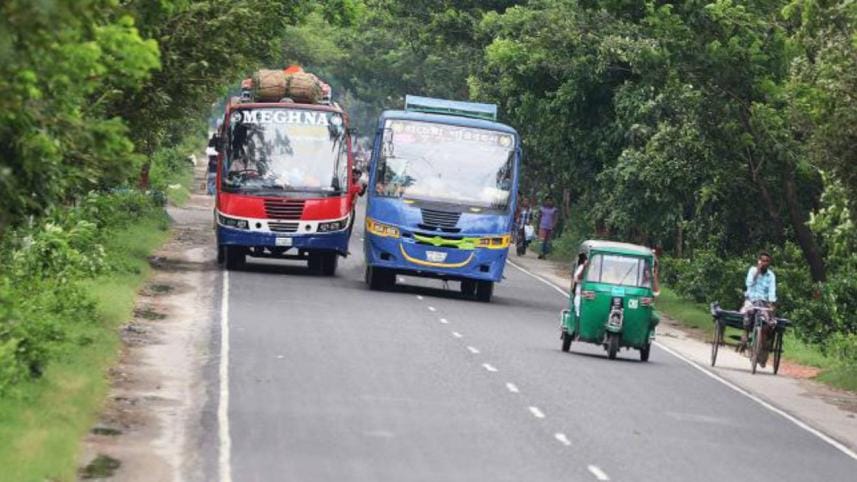Implementing Transport Act: Delay due to pressure from transport men

The government is taking time to make the Road Transport Act-2018 effective as it faces “pressure” from the transport leaders to change some of its provisions, officials said.
A three-minister committee, tasked with looking into how the act could be implemented, yesterday decided to sit with transport leaders and other stakeholders next month before giving its opinion.
“There is no scope for making the law effective before it [discussion],” Railway Minister Nurul Islam Sujan, member of the committee, told The Daily Star after the meeting.
Earlier, the committee held several informal meetings with transport leaders who pressed for relaxing several provisions of the act, including making all offences under the law “bailable”.
The Jatiya Sangsad had passed the act in September last year following an unprecedented student movement for safe road. Students took to the streets across the country after two college students were killed by a bus on Airport Road in the capital on July 29.
Road Transport and Bridges Minister Obaidul Quader had earlier said discipline on roads would be restored once the law came into force.
However, the government, as per requirement of the law, is yet to publish a gazette notice determining when the law will come into effect.
The government said preparing rules for the act is a must for execution of some of its sections. So, it will be made effective after the enactment of the rules.
After failing to meet four deadlines, Bangladesh Road Transport Authority (BRTA) submitted a draft rule for the act in May.
Later, the Road Transport and Highways Division formed a 10-member committee, led by its Additional Secretary Abdul Malek, to scrutinise the rule.
The committee is scheduled to hold its second meeting tomorrow.
Several officials of the road transport ministry and the BRTA blamed pressure from the transport leaders for the delay in making the law effective.
They said the government does not want to make the transport organisations angry. Instead, it wants to solve the problem by meeting some demands of the platforms, mainly led by ruling Awami League leaders.
Quader, also the AL general secretary, on several occasions said the government was looking into whether the transport workers’ demands could be met by formulating rules.
‘PRESSURE FROM TRANSPORT LEADERS’
After the passage of the act, Bangladesh Road Transport Workers Federation observed a two-day strike on October 28-29 last year demanding changes to the law.
Their demands include revoking the Tk5 lakh fine for causing road accidents, making all accident related cases bailable, and reducing the mandatory educational qualification requirements from class-VIII to class-V for getting a driving licence.
AL lawmaker Shajahan Khan, also a former minister, is the executive president of the federation. Safety campaigners said the platforms previously “disobeyed the government’s decisions and held the people hostage” to realise their demands.
Bangladesh Goods Transport Owners Workers United Council, a forum of transport owners and workers carrying goods, also observed a three-day strike in Dhaka to press home similar demands.
Against this backdrop, the three-minister committee was formed. The committee, comprising law, home and railway ministers, held its first meeting yesterday, with Home Minister Asaduzzaman Khan in the chair.
“We had several meetings with the stakeholders and will hold another meeting with the leaders of transport owners and workers for further discussions,” said Nurul Islam Sujan.
The tentative date for the meeting is August 29, he added.
Osman Ali, general secretary of the Workers Federation, told The Daily Star yesterday that during their informal meeting with the committee, they mainly pressed for two changes to the act.
According to the new law, a driver may face a maximum five-year imprisonment or a fine of Tk5 lakh or both for causing death or injury to a person by reckless driving and the offense is non-bailable.
A driver would face three-year jail for the same offence as per the Motor Vehicles Ordinance-1983, which is still in force.
Osman said they have no objection to the provision for punishment, but they demanded the committee make the offence bailable.
The law also stipulates that a driver or conductor or associates will face three-year jail or a fine of Tk3 lakh or both for causing damage to a person’s life or properties by reckless driving or overspeeding or overloading. The offence is also non-bailable.
Osman said they demanded reducing the punishment of drivers, conductors and owners for overloading and making the offence bailable.
He said transport agencies, who were mainly responsible for overloading, should be brought to book.
“They [committee members] have assured us of checking whether the offence can be made bailable. They also had a similar response about our other demands.”
Asked whether the committee would recommend relaxing the law, Railway Minister Sujan, also a Supreme Court lawyer, said, “There are some inconsistencies and repetitions in the act. They [transport leaders] also raised objections on some issues. We will look into it.”
Osman, however, denied that they were delaying making the law effective.
“Parliament enacted the law in the face of a student movement without proper scrutiny and that’s why its implementation is taking time,” he claimed.
 For all latest news, follow The Daily Star's Google News channel.
For all latest news, follow The Daily Star's Google News channel.
Comments